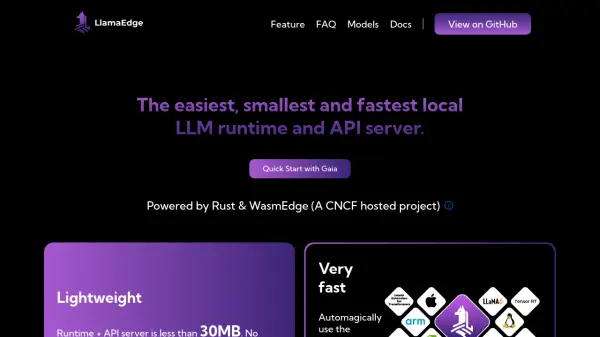What is LlamaEdge?
LlamaEdge provides a lightweight and highly efficient local Large Language Model (LLM) runtime and API server. It is engineered using Rust and WasmEdge, a CNCF hosted project, enabling developers to create cross-platform LLM agents and web services. This technology stack ensures that the runtime and API server are exceptionally small, under 30MB, and operate without external dependencies or Python packages, automatically leveraging local hardware and software acceleration for optimal speed.
The platform emphasizes portability, allowing applications written once in Rust or JavaScript to run anywhere, including on devices with GPUs like MacBooks or NVIDIA hardware. LlamaEdge is designed for heterogeneous edge environments, facilitating the orchestration and movement of LLM applications across CPUs, GPUs, and NPUs. It offers a modular approach, enabling users to assemble LLM agents and applications from components, resulting in self-contained application binaries that run consistently across various devices.
Features
- Lightweight Runtime: Runtime + API server is less than 30MB with no external dependencies or Python packages.
- High Speed Performance: Automatically uses the device's local hardware and software acceleration for fast operation.
- Cross-Platform Compatibility: Write LLM applications once in Rust or JavaScript and run them anywhere, including on GPUs (e.g., MacBook, NVIDIA devices).
- Heterogeneous Edge Native: Designed to orchestrate and move LLM applications across CPUs, GPUs, and NPUs.
- Modular Application Building: Assemble LLM agents and applications from components, compiling to a self-contained binary.
- OpenAI-Compatible API Server: Option to start an OpenAI-compatible API server that utilizes local hardware acceleration.
Use Cases
- Developing and deploying local LLM applications without relying on expensive or restrictive hosted APIs.
- Building privacy-focused LLM agents that process data locally.
- Creating custom LLM web services for specific knowledge domains.
- Deploying LLM inference applications on edge devices with limited resources.
- Simplifying the deployment of LLM applications across different hardware (CPU, GPU, NPU).
- Building integrated LLM solutions without complex Python dependencies.
FAQs
-
Why can't I just use the OpenAI API?
Hosted LLM APIs are expensive, difficult to customize, heavily censored, and pose privacy risks. LlamaEdge allows for private, customizable local LLMs without these drawbacks. -
Why can't I just start an OpenAI-compatible API server over an open-source model, and then use frameworks like LangChain or LlamaIndex in front of the API to build my app?
While possible (and LlamaEdge can start such a server), LlamaEdge offers a more compact and integrated solution using Rust or JavaScript. This avoids a complex mixture of LLM runtime, API server, Python middleware, UI, and glue code, simplifying development and deployment. -
Why can't I use Python to run the LLM inference?
Python setups like PyTorch have large and complex dependencies (over 5GB) that often conflict and are difficult to manage across development and deployment machines, especially with GPUs. In contrast, the entire LlamaEdge runtime is less than 30MB and has no external dependencies. -
Why can't I just use native (C/C++ compiled) inference engines?
Native compiled applications lack portability, requiring rebuilds and retesting for each computer they are deployed on. LlamaEdge programs are written in Rust (soon JS) and compiled to Wasm, which runs as fast as native apps and is entirely portable.
Related Queries
Helpful for people in the following professions
LlamaEdge Uptime Monitor
Average Uptime
99.86%
Average Response Time
80.83 ms
Featured Tools
Join Our Newsletter
Stay updated with the latest AI tools, news, and offers by subscribing to our weekly newsletter.











